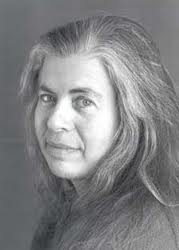 In “Why Poems Should Not Be Fictions,” one of the pieces in Libby Scheier’s Kaddish For My Father: New and Selected Poems, 1970-1999 (ECW Press, 1999), the Toronto poet seems to imply that there’s already too much artifice in the world and that the poet should perform her art unmasked, without resorting to a narrative disguise.
In “Why Poems Should Not Be Fictions,” one of the pieces in Libby Scheier’s Kaddish For My Father: New and Selected Poems, 1970-1999 (ECW Press, 1999), the Toronto poet seems to imply that there’s already too much artifice in the world and that the poet should perform her art unmasked, without resorting to a narrative disguise.
Although at times resembling novelistic prose, Sheier’s poetry seems intensely autobiographical, more like a personal diary than fiction. Whether this is an illusion is immaterial: with Kaddish For My Father, we are lowered into a seething inferno of words that seems, on the surface, to be a no-holds-barred emotional journal that the poet kept of her father’s illness and death from 1995 to 1997.
Unhealed memories parade through these pages like so many Banquo’s ghosts. Scheier describes a difficult, abusive, bullying father, still intimidating even though frail and dying, with whom she is desperately seeking an elusive peace.
The reader does not long remain a stranger: quickly we are brought into the solipsistic circle of the poet’s grief, which seems as angry and troubled as the storm clouds that sometimes threaten her city. We become privy to recollections of a childhood sexual assault, fantasies of fraternal incest, and to repeated descriptions of her undying rage against her father and the tortuous Oedipal posturings of family members around him as he lay dying.
An intensely physical poet, Scheier does not shy away from confronting difficult realities; no one could accuse her of being demure. If she owes much to Allen Ginsberg’s poetic Kaddish of the 1950s in which he detailed his mother’s descent into madness, she also boasts a Ginsberg-like fascination with body parts and functions, especially sexual. She steps gingerly into the sensual garden of Sappho.
Counterbalancing the acute physicality is an intense spirituality that is manifested through her repeated consultation of the sky above her Harbourfront condominium. Light equals spirit in the calculus of these poems, and Scheier is constantly divining the heavens as if redemption might arrive along with the purity of a sunrise or the brilliant transparency of the morning air.
Religious imagery also runs through many of the roughly 36 poems in this non-traditional Kaddish. Scheier evidently seeks redemption in her Jewish roots — or, at least, in her revisionist brand of Judaism in which women don phylacteries.
The poet struggles to reconcile herself to her Jewishness, as she does with the fact that she is and will always be her father’s daughter. He is, she says, the “yud of my heart,” a pun that underlies the meaning of her mourning cycle of poetry. A yud is a Jew; it is also the tenth letter of the Hebrew alphabet and the first letter of the Holy Name, and thus an essential doorway to spirituality and self-fulfillment.
In an early poem, “Wheelchair, 1”, which is typical for its shocking honesty, Scheier writes of “how simple it would be to just tip the chair and watch him tumble down a steep ravine, never to hurt anyone again.” But she knows she cannot. She confronts the painful, universal conundrum of childhood anger with bravery and uncommon literary skill.
Sometimes her free verse is elevating, but more usually it is degraded and undisciplined, like most modern poetry. Since her best pieces are prose, she might do well to attempt a novel, even if it means donning the fictional mask. More joy and a lot less anger will definitely round out her artistic pallette. ♦
Postscript: Libby Scheier died in 2000.
© 1999






